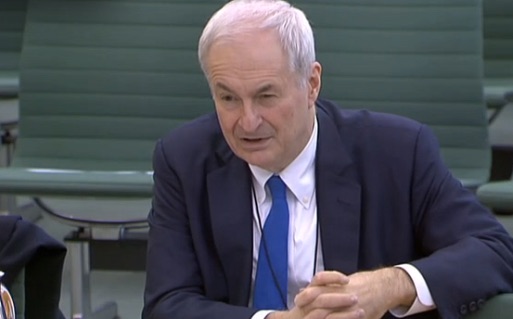[contextly_auto_sidebar id=”hdx1xC2KfZvBvxSjenKPEc9mHvJnz6tM”]
 ‘A science fiction case’. That was how Paul Gambaccini referred to the police investigation into the now-dropped allegation of historic sex abuse made against him which led to ’12 months of trauma’. The veteran BBC DJ was giving evidence to the Home Affairs Select Committee on the operation of police bail in a one-off session which took evidence from the Chief Constable of Nottinghamshire Police, Chris Eyre and the Director of Public Prosecutions, Alison Saunders.
‘A science fiction case’. That was how Paul Gambaccini referred to the police investigation into the now-dropped allegation of historic sex abuse made against him which led to ’12 months of trauma’. The veteran BBC DJ was giving evidence to the Home Affairs Select Committee on the operation of police bail in a one-off session which took evidence from the Chief Constable of Nottinghamshire Police, Chris Eyre and the Director of Public Prosecutions, Alison Saunders.
‘I faced the full weight of the state with unlimited financial resources for 12 months for no reason,’ Gambaccini told MPs. ‘It was a completely fictitious case. It was a science fiction case. It required time travel and I do not have a time machine.’ Gambaccini said that it was ‘astonishing’ because the police knew it was ‘a nothing case’ and ‘indeed had known it was a nothing case because, without my knowing it, they had investigated it for four and a half months and dropped it seven weeks before I was arrested’.
The DJ is backing a 28-day limit on the use of police bail. Gambaccini was arrested on suspicion of historical sexual abuse and placed on bail for a year before the case against him was dropped in October. He reckoned that lost earnings and legal fees came to more than £200,000.
- You can read Greg Foxsmith on the law relating to police bail following coverage of Freddie Starr’s 19 months on bail before his case was dropped
- www.thejusticegap.com was a signatory to an open letter sent to the Daily Telegraph and Guardian calling upon the government to reform police bail.
There is currently no limit on the length of time police can place someone on pre-charge bail and so people have no rights of protest and are at the mercy of the police force that arrests them. It is reckoned that more than 70,000 people are presently languishing on bail and more than 5,000 for more than six months.
The Home Office has recently concluded a consultation on its proposal to introduce an initial statutory time-limit on pre-charge bail to 28 days (for critical analysis of that proposal see Liberty’s response here).
Human flypaper
Paul Gambaccini, one of a large number of celebrities investigated as part of Operation Yewtree, was invited to give evidence to the MPs alongside his solicitor Kate Goold, a partner in the criminal law team at Bindmans LLP. He was first arrested in December 2013, re-bailed five times before the CPS decided to drop the case in October last year.
The police argued that it was necessary to retain the DJ on bail pending further enquiries despite evidence suggesting that the CPS felt that the case was going nowhere at least as early as May 2014.
‘Each time a reason was given but it was always opaque,’ the DJ told MPs. ‘We were told in March that they were seeking information, but they would not tell us what it was. Then in May they were seeking information from third parties, but they would not reveal [in general terms, who those third parties were]. Then on 30 June when they jumped to the bail date of 7 July they said that it was to re-interview my accuser, which surprised me because I did not know if someone, having failed to get a good bite of you the third time, gets a second bite.’
The DJ claimed that his re-bailing coincided with developments in other high profile cases such as Rolf Harris and Max Clifford. The Committee chairman paraphrased him as saying that it was ‘a concerted attempt to link you to other cases unconnected to you in order to use the oxygen and publicity to somehow see if perhaps other people might come out to make similar accusations’.
‘You are exposed in the first place so that other people will accuse you because in the mutation of the British justice system that has occurred in the last few years, from the centuries-old, internationally-respected, objective, evidence-based system to the subjective rumour-and-accusation-based system, evidence is no longer required. Only people who agree.’
Paul Gambaccini
Gambaccini quoted Stephen Fry describing this as ‘the flypaper tactic’ where ‘they put up a human being as a piece of flypaper and see what gets attracted to it’. The DJ revealed that he was dropped ‘instantly’ from all but one of his longstanding media engagements. For the time he was on bail, he earned nothing whilst having to meet his legal fees of £200,000.
As David Winnick MP pointed out, where an allegation is made of criminality, the police have a duty to investigate it. Gambaccini took the point but stressed that there had to be a balance to be struck between the effective investigation of crime and the impact of those police powers on innocent people. ‘There is, has always been and always will be a way of dealing with genuine offenders. It is called the law and you do not need a witch hunt to enforce the law,’ he said.
And, the MPs asked, what of a 28-day limit on pre-charge bail? ‘I enthusiastically support that because I have come to realise that in cases such as mine – and, of course, I do not speak for the entire corpus of work of the police – it seems to me that, with the exception of underfunding, there is no possible excuse for further delay in leaving somebody out to dry.’






